Home → Air Quality → Mobile Sources → Clean Diesel, DERA
Maine's Clean Diesel Grant Program

The Maine Clean Diesel Grant Program is a reimbursement program created with the purpose of reducing diesel emissions from legacy engines in Maine. This program is funded by the United States Environmental Protection Agency (EPA) through the Diesel Emissions Reduction Act (DERA) to assist States in their efforts to develop diesel emissions reduction programs.
DERA grant funds are awarded for eligible projects that reduce public exposure to emissions from diesel-powered engines and the associated risks to public health and the environment. Priority is given to replace non-regulated engines that do not meet emission standards which are the most cost effective to achieving the greatest emission reductions of Nitrous oxides (NOx) and particulate matter (PM).
What vehicles and equipment are eligible?
Diesel-powered engines, vehicles and equipment currently operating in Maine. These may include:
- buses,
- locomotives,
- heavy-duty trucks, defined as Class 5 through Class 8: Class 5 (16,001 -19,500 lbs gross vehicle weight rating [GVWR]); Class 6 (19,501 - 26,000 lbs GVWR); Class 7 (26,001 - 33,000 lbs GVWR); Class 8a (33,001 - 60,000 lbs GVWR); Class 8b (60,001 lbs GVWR and over),
- marine engines, and
- nonroad engines, equipment or vehicles used in construction, handling of cargo, agriculture, mining or energy production (stationary generators and pumps).
What projects are eligible?
Eligible diesel emission reduction projects include:
- certified vehicle or equipment replacement with all-electric or alternative fuel;
- certified marine engine replacements;
- clean alternative fuel conversions;
- verified emission control technologies such as exhaust controls, cleaner fuels, and engine upgrades;
- verified idle reduction technologies such as auxiliary power units, fuel operated heaters, shore connection systems, transport refrigeration unit (TRU) electrified parking spaces, and truck stop electrification technologies.
Who is eligible to apply?
All interested local, State and regional agencies, institutions, as well as businesses, commercial fishermen, and nonprofit organizations operating in the State of Maine.
What portion of the project cost is reimbursed?
Cost share requirements vary depending on the project. For example, the program can fund up to 45% of the cost of replacing a heavy-duty diesel truck with a new, electric vehicle, including charging infrastructure, while up to 40% for a marine engine repower. For more information, please review the 2023/2024 DERA State Program Guide.
How do I apply?
The Maine Department of Environmental Protection periodically solicits applications from potential project partners for projects that achieve significant reductions in diesel emissions from diesel powered engines, vehicles and equipment operating in Maine. Funding is awarded through a rolling application process until all funds have been committed.
How do I get more information?
The Maine Clean Diesel Program is managed by the Mobile Sources Section within the Bureau of Air Quality. Please relay all questions about potential projects or eligibility requirements to Peter Carleton (207) 242-6103.
DERA Highlights
-
In 2009, the Maine Department of Environmental Protection (DEP) established the first statewide marine engine repower program in the nation to replace highly emitting unregulated marine engines with cleaner new EPA Tier 3 certified engines. As of July 2024, the Maine Clean Marine Engine Program, has awarded $6.6 million from the Diesel Emission Reduction Act to repower 180 commercial vessels, the majority of which are lobster boats, but also include research vessels, schooners, whale watch and excursion vessels, and tugboats. Since 2009 the program has been administered in a successful partnership with Maine Marine Trades Association.
This program has numerous benefits including 45% reduction in NOx of 99.69 tons/year, and a 73% reduction of 7.39 tons/year of PM, as well as economic stimulus in rural communities by potentially creating and retaining jobs for engine distributors and dealers, boatyards, fishermen and their co-ops.
The Maine DEP and its partner Maine Marine Trades Association (MMTA) reach out to boat yards for eligible applications. Eligible engines are not beyond their useful life and will operate for three more years. The Maine DEP selects applications based on a cost effectiveness formula for reducing NOx and PM calculated from annual fuel use, rated horsepower, engine emission factors and the cost of the new engine.
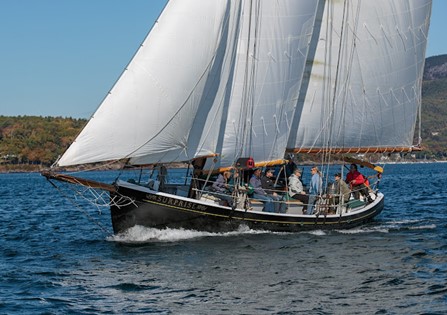
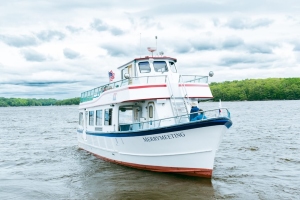
The vessels repowered include the historic Schooner Surprise as well as Merrymeeting, an excursion vessel used for lighthouse cruises on the Kennebec River owned and operated by Maine Maritime Museum.
The Maine DEP repowered two of Maine’s iconic and beloved vessels.
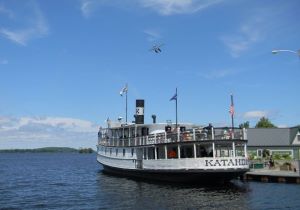 One project was for a marine engine replacement of the historic 1914 steamboat Katahdin that is an excursion vessel on Moosehead Lake and operated by the Moosehead Marine Museum. The Moosehead Marine Museum applied to replace two 2-stroke vintage diesel engines with one new Tier 3 engine that will reduce emissions and improve fuel economy and provide a more comfortable experience for its passengers.
One project was for a marine engine replacement of the historic 1914 steamboat Katahdin that is an excursion vessel on Moosehead Lake and operated by the Moosehead Marine Museum. The Moosehead Marine Museum applied to replace two 2-stroke vintage diesel engines with one new Tier 3 engine that will reduce emissions and improve fuel economy and provide a more comfortable experience for its passengers.
The other iconic marine engine replacement project was the Laura B built in 1943, the 65-foot wooden vessel is rigged as a heavy-duty work boat.
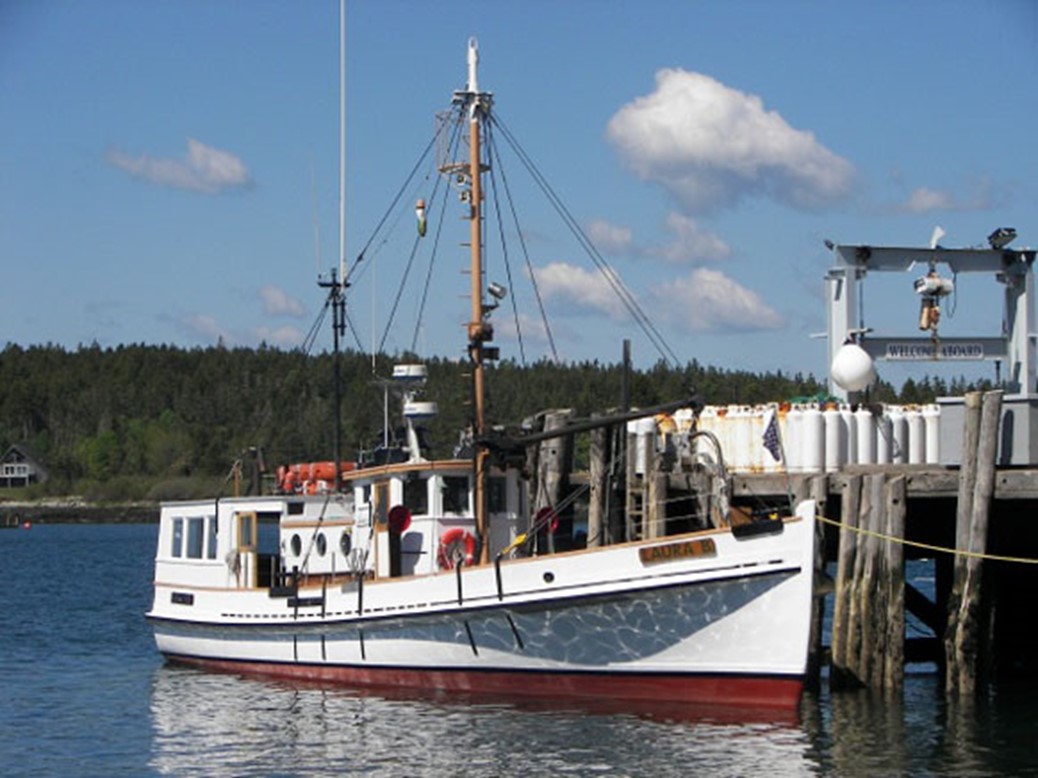 Originally designated a U.S. Army T-57, she spent World War II in the Pacific, where she served as a patrol boat and carried troops and supplies. For the past half century, the Laura B has been ferrying passengers, freight, and mail between Port Clyde and Monhegan Island. This repower project will reduce .51 tons of NOx and .04 tons of PM annually. The majority of the vessels were for lobster fishing.
Originally designated a U.S. Army T-57, she spent World War II in the Pacific, where she served as a patrol boat and carried troops and supplies. For the past half century, the Laura B has been ferrying passengers, freight, and mail between Port Clyde and Monhegan Island. This repower project will reduce .51 tons of NOx and .04 tons of PM annually. The majority of the vessels were for lobster fishing.
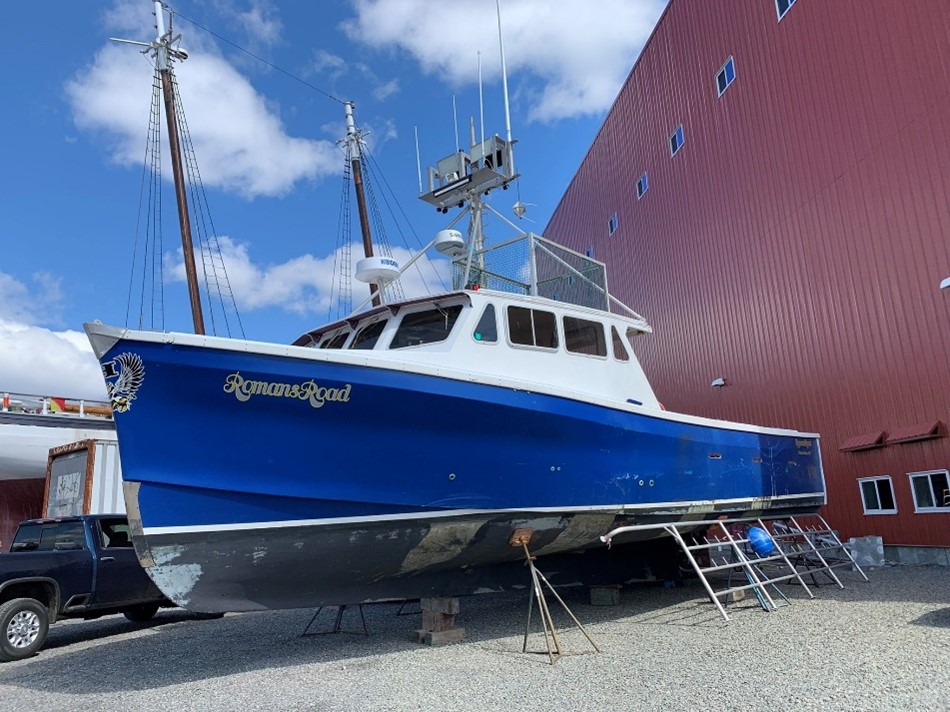
Funding from the DERA 2021 FY grant funded thirteen fishing vessels including Romans Road from Harpswell which repowered at Jakes Repair Service in Cundy’s Harbor.
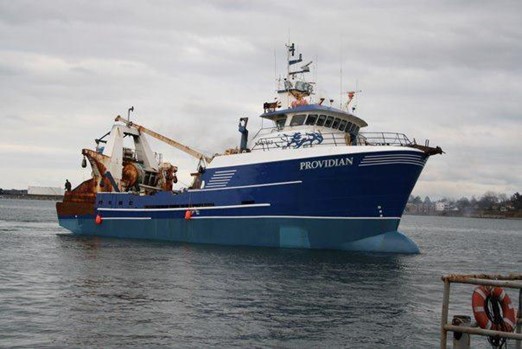
The Providian, a fishing trawler based out of Portland repowered in 2012.
DERA Projects
-
2024 State DERA Grant
In November of 2025, DEP received new grant funding from EPA's State DERA program. The 2024 FY State DERA projects will be funded by a combination of DEP's 2024 and 2023 State DERA allocations.
2023 State DERA Grant
In January of 2024, DEP received a new year of funding from EPA's State DERA program. The 2023 FY State DERA projects are being funded by a combination of DEP's 2023 State DERA allocation, "DERA Option" matching funds from the Volkswagen Diesel Emissions Environmental Mitigation Trust (VW Trust), and an EPA match incentive. The following new projects were selected for 2023 State DERA funding:
- O’Connor GMC, Inc.: up to $784,136 in grant funds for the scrappage and replacement of seventeen diesel school buses from seven school districts with California certified Low NOx, near zero emission, propane school buses.
- Maine Marine Trades Association, the administrator of Maine’s Clean Marine Engine Program received $290,000 to replace approximately ten marine engines on nine lobster boats and one excursion vessel, the Bennie Alice which serves the Cabbage Island lobster bakes.
- City of Presque Isle: $112,117 in grant funds for the scrappage and replacement of two diesel-powered ground support equipment with electric aircraft tugs. These aircraft pushback tugs replace existing diesel- powered ground support equipment used at Presque Isle International Airport. The largest of the two tugs is rated at 120,000 lbs., the second tug is in the 40,000 lbs. class. Aircraft tugs are specialized ground support vehicles that are used to safely push an aircraft backward away from the airport gate when it's ready for departure as well as to tow planes into and out of maintenance hangars for servicing. The funding includes costs for the EV charging equipment.
2022 State DERA Grant
In October of 2022, DEP received a new year of funding from EPA's State DERA program. The 2022 FY State DERA projects are being funded by a combination of DEP's 2022 and 2021 State DERA allocations, "DERA Option" matching funds from the Volkswagen Diesel Emissions Environmental Mitigation Trust (VW Trust), and an EPA match incentive. The following new projects were selected for 2022 State DERA funding:
- The City of Portland: $552,278 in grant funds for the scrappage and replacement of a 2001 diesel Crane Carrier refuse hauler with a Mack LR electric refuse hauler. The funding includes costs for the EV charging equipment.
- O’Connor GMC, Inc.: $186,030 in grant funds for the scrappage and replacement of four diesel school buses from three school districts with California certified Low NOx, near zero emission, propane school buses.
2021 State DERA Grant
In October of 2021, DEP received a new year of funding from EPA's State DERA program. The 2021 FY State DERA projects are being funded by a combination of DEP's 2021 State DERA allocation, "DERA Option" matching funds from the Volkswagen Diesel Emissions Environmental Mitigation Trust (VW Trust), and an EPA match incentive.
- Maine Marine Trades Association, the administrator of Maine’s Clean Marine Engine Program received $429,193 to replace thirteen marine engines on eleven lobster boats and two water taxis serving the mid-coast area.
- Cyr Bus Lines: $348,146 in grant funds for the scrappage and replacement of two diesel school buses with two new electric Thomas Freightliner school buses. The funding includes costs for the EV charging equipment.
2020 State DERA Grant
In September of 2020, DEP received a new year of funding from EPA's State DERA program. The 2020 FY State DERA projects are being funded by a combination of DEP's 2019 and 2020 State DERA allocations, "DERA Option" matching funds from the Volkswagen Diesel Emissions Environmental Mitigation Trust (VW Trust), and an EPA match incentive.
- Maine Marine Trades Association, the administrator of Maine’s Clean Marine Engine Program received $670,807 to repower twenty marine vessels, including fifteen lobster boats, an Eastport excursion vessel, a Portland whale watch vessel, the historic Schooner Surprise and Laura B, the mail boat for Monhegan Island, as well as Merrymeeting, an excursion vessel used for lighthouse cruises on the Kennebec River owned and operated by Maine Maritime Museum.
- Hissong Ready Mix: $124,688 in grant funds for the scrappage and replacement of three pre-2009 model year diesel class 8 concrete mixer trucks with cleaner diesel concrete mixers.
- W.C. Cressey and Sons: $100,000 in grant funds for the scrappage and replacement of five pre-2009 model-year diesel school buses with new, cleaner diesel buses that serve RSU 73/Livermore Falls.
2019 State DERA Grant
In September of 2019, DEP received a new year of funding from EPA's State DERA program. The 2019 FY State DERA projects are being funded by a combination of DEP's 2019 DERA allocations, "DERA Option" matching funds from the Volkswagen Diesel Emissions Environmental Mitigation Trust (VW Trust), and an EPA match incentive.
Ecomaine, a waste to energy facility, was awarded $531,100 to replace two diesel roll-off trucks with electric roll-off trucks for transporting incinerator ash to their landfill. Ecomaine was under contract with Lion Electric Company for two years to manufacture two electric roll-off trucks.
However, the two electric roll-off trucks could not be designed, manufactured and delivered by Lion Electric. The project was eventually withdrawn by Ecomaine. EPA amended the DEP Cooperative Agreement in August 2022 to reduce the state contribution and cost share amounts by $762,837.
- Maine Marine Trades Association, the administrator of Maine’s Clean Marine Engine Program received $500,000 to repower sixteen marine vessels including fifteen commercial lobster boats, and a marine patrol boat.
- First Student, Inc.: $44,012 in grant funds for the scrappage and replacement of two pre-2009 model year diesel school buses with new, cleaner diesel buses that serve the Augusta School District.
- Student Transportation of America: $58,857 in grant funds for the scrappage and replacement of three pre-2009 model-year diesel school buses with new, cleaner diesel buses that serve Wells.
- Sysco of Northern New England: $100,355 in grant funds for the scrappage and replacement of three pre-2009 model-year diesel class-8 short-haul combination freight trucks and one class-7 straight truck with cleaner diesel engine freight trucks.
2018 and 2017 State DERA Grant
In September of 2018, DEP received a new year of funding from EPA's State DERA program. The 2019 FY State DERA projects are being funded by a combination of DEP's 2017 and 2018 DERA allocations, "DERA Option" matching funds from the Volkswagen Diesel Emissions Environmental Mitigation Trust (VW Trust), and an EPA match incentive.
- Maine Marine Trades Association, the administrator of Maine’s Clean Marine Engine Program received $708,657 to repower twenty-nine marine vessels including twenty-five commercial lobster boats, a lobster smack that sells bait to fishermen and buys lobsters wholesale for the market, a small tugboat, the historic schooner American Eagle and steamship Katahdin operated by the Moosehead Marine Museum.
- RSU #73: $25,000 in grant funds for the scrappage and replacement of one pre-2009 model year diesel school bus with a new cleaner diesel bus that serves the Spruce Mountain School District.
- Student Transportation of America: $133,718 in grant funds for the scrappage and replacement of three pre-2009 model-year diesel school buses with new, cleaner diesel buses that serve Wells-Ogunquit.
- Sysco of Northern New England: $157,630 in grant funds for the scrappage and replacement of six pre-2009 model-year diesel class-8 short-haul combination freight trucks with cleaner diesel engine freight trucks.
Sysco proposed to replace one class-7 straight truck with a cleaner diesel engine freight truck but due to supply shortages during the pandemic, the delivery was delayed beyond the grant deadline and did not receive funding. - Perley S. Burpee: $2,856 for an auxiliary power unit to reduce diesel emissions from a class-8 long-haul combination freight truck.
DERA Archive
-
Past State DERA Projects
Maine Clean Diesel Program FY 2016 Federal Cost Share MMTA/Marine Engine Repower 3 vessels $104,515 $156,773 CM&QR Locomotive 6 APUs $109,698 $164,547 Total $214,213 $321,320 Maine Clean Diesel Program FY 2015 Federal Cost Share MMTA/Marine Engine Repower 4 vessels $117,186 $175,779 Total $117,186 $175,779 Maine Clean Diesel Program FY 2014 Federal Cost Share MMTA/Marine Engine Repower 2 vessels $51,307 $76,962 Scarborough Propane Buses $26,684 $153,316 Total $77,991 $230,278 Maine Clean Diesel Program FY 2013 Federal Cost Share MSAD #9 - 4 Propane School Buses $60,000 $224,974 Marine Engine Repower 1 vessel $48,849 $73,273 Total $109,509 $298,247 Maine Clean Diesel Program FY 2012 Federal Cost Share MSAD #59 - 3 Propane Buses $45,495 $104,086 Marine Engine Repower 2 vessels $63,603 $95,404 School Bus 35 Auxiliary Heaters $70,000 Total $179,098 $200,510 Past National Competitive DERA Grants
2012 National Clean Diesel Program Federal Cost Share Total 4 CNG School Buses Portland Schools $132,173 $396,519 $528,692 Repower McAllister Tug Boat $1,235,197 $1,235,197 $2,470,394 Replace 2 gensets $20,000 $60,000 $80,000 Total $1,387,370 $1,691,716 $3,079,086 2011 National Clean Diesel Program Federal Cost Share Total Clean Marine Engine Program Repowered MSFS Governor Curtis $139,075 $189,075 $328,150 Pink Lady II Whale Watch Boat $110,925 $110,925 $221,850 Total $250,000 $300,000 $550,000 2010 National Clean Diesel Program Federal Cost Share Total Clean Marine Engine Program/22 boats $589,064 $732,544 $1,321,608 Total $589,064 $732,544 $1,321,608 ARRA 2009 National Clean Diesel Program Federal Cost Share Total Clean Construction Project $741,768.64 $260,970.44 $1,002,739.08 Total $741,768.64 $260,970.44 $1,002,739.08